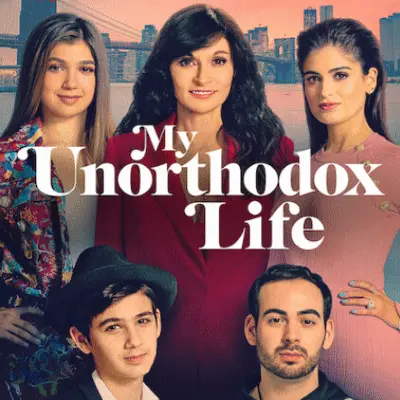Not everybody is happy with Netflix's obsession with Orthodox Jews
-

From Shtisel to Unorthodox to My Unorthodox Life, these are boom times for stories on Netflix about ultra-Orthodox, or Haredi, Jews, says Joseph Bernstein. "Before My Unorthodox Life, which has already received a renewal for a second season, there was the early-pandemic hit Unorthodox, a Netflix drama inspired by Deborah Feldman’s bestselling memoir about a young woman fleeing the Satmar community in Brooklyn. And before Unorthodox, there was Shtisel, the 2013 Israeli soap opera that became such a sensation after it arrived on Netflix in 2018 that its creators made a third season. An American show inspired by Shtisel and directed by Kenneth Lonergan is in the works. So too is Diamonds, ordered by Netflix for a 2022 premiere and set among the Haredi Jews of Antwerp, Belgium...The shows range widely in tone and perspective. Shtisel, for example, is a gentle drama about the relationship between a hidebound but loving Haredi father in Jerusalem and his son, a young rabbi who yearns to be a painter. It strenuously avoids judging its subject matter. Meanwhile, critics have applauded Unorthodox for its 'intensity, cultural specificity and psychological acuity' in telling the story of Esty, a stifled Haredi wife who escapes to Berlin to pursue her musical dreams. But many of the shows have received criticism from Orthodox Jews for focusing on unflattering aspects of Haredi life, and in particular on people who leave their communities. This has led some in the Orthodox world to grapple with the thoroughly modern issue of representation in popular entertainment. It’s a question that other minority groups in the United States have struggled with, painfully, for decades. But in the case of ultra-Orthodox communities, many of which define themselves by their distance from or rejection of the secular world, it becomes even more complicated. What does it mean to accurately represent a group that barely participates in its own representation?"
ALSO:
- Women of the Yeshivish community that Julia Haart left say they feel misrepresented in My Unorthodox Life: “People in Monsey are upset because she has misrepresented what Orthodox people and particularly Orthodox women are all about,” says Vivian Schneck-Last, a technology consultant who has an MBA from Columbia University and worked as a managing director at Goldman Sachs. She feels Haart diminishes the intellectual and professional strides that women in the community have made. Under the hashtag #myorthodoxlife, women have described their own successful careers and general satisfaction with the religious life. “People were beyond upset, people were personally insulted,” said Allison Josephs, the founder of the Jew in the City website, who said people posted complaints on the site, which she created to change negative perceptions of religious Jews. “Pretty much every Jew I encountered was feeling, ‘Can you believe what they did to us again?’”
TOPICS: My Unorthodox Life, Shtisel, Unorthodox, Julia Haart, Jews and TV
More My Unorthodox Life on Primetimer:- My Unorthodox Life Season 2 Is a Master Class in Spin
- TV Today: Slow Horses, Riches, and George & Tammy Bring the Drama
- The View Misses an Opportunity to Ask Julia Haart About Being Fired From Elite World Group
- My Unorthodox Life star Julia Haart's estranged husband accuses her of “illegally” withdrawing $850,000 from their company account
